12 July 2023
Martin Hurson — Died on 13 July 1981 after 46 days on hunger strike in the H-Blocks of Long Kesh
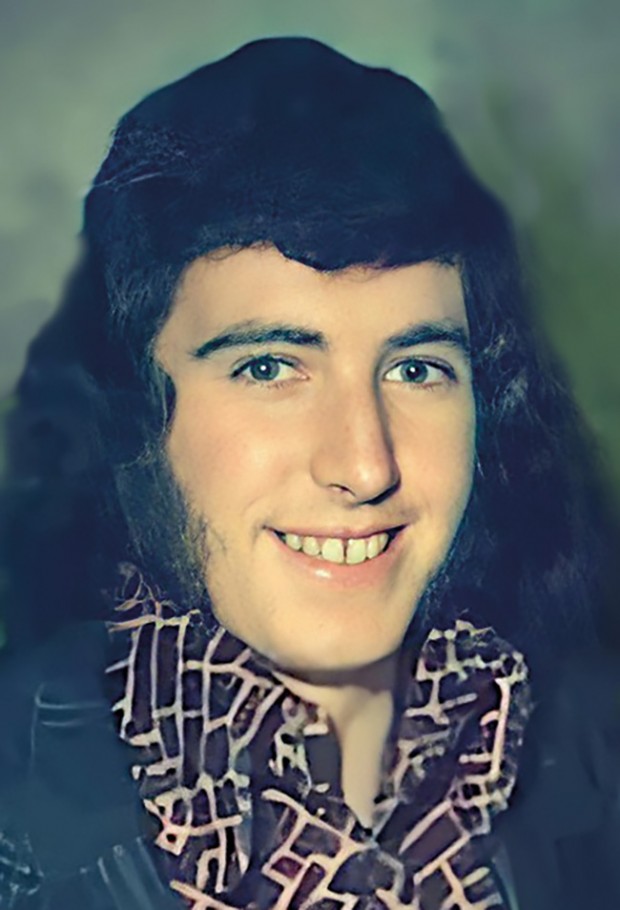
MARTIN HURSON, aged 24, was born in Cappagh, County Tyrone, on 13 September 1956.
Martin was arrested in November 1976 and was charged with possession of explosives following sustained physical abuse at the hands of the RUC. He received a 20-year sentence in November 1977, which he unsuccessfully appealed against on a number of occasions.
• — • — • — • — • — • — • — • — • — • — •
An IRA Volunteer, Martin stood as a H-Blocks/Armagh candidate in the Longford/Westmeath constituency during the June 1981 general election in the South, polling extremely well but missing out on election.
He spent 46 days on hunger strike from 29 May. He died on 13 July 1981.
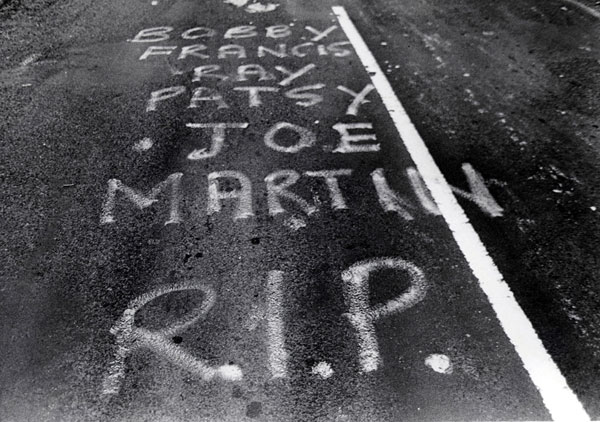
Shock at death of Martin Hurson
THE death of IRA Volunteer Martin Hurson on 13 July 1981, after 46 days on the Hunger Strike, was unexpected. The suddenness of his death, coming only five days after that of Joe McDonnell, came as a shock since two other Hunger Strikers – Kieran Doherty and Kevin Lynch – had been almost a week on hunger strike ahead of Martin.
Martin had replaced south Derry man Brendan McLaughlin, who was forced to come off the Hunger Strike due to a burst stomach ulcer. His health since being moved to the prison hospital had been deteriorating at a far quicker rate than that of his comrades. Throughout the Hunger Strike he had difficulty keeping down the required daily five pints of water. This problem caused him to hallucinate and he suffered from a degree of incoherence in his speech. He rapidly deteriorated towards the end.
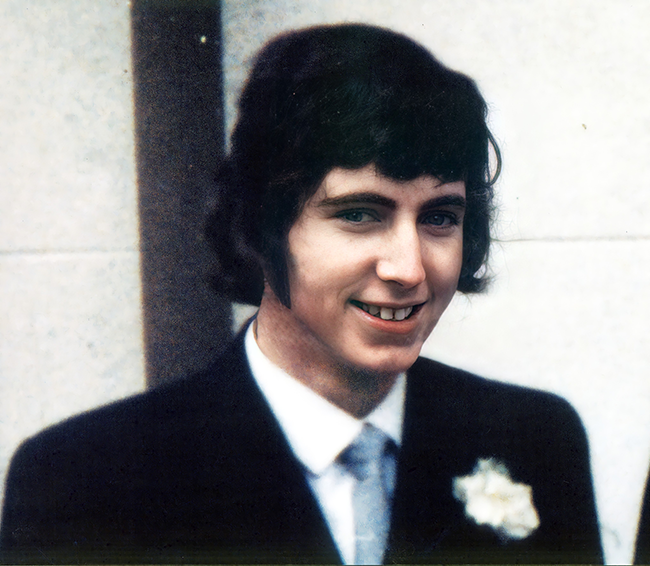
Martin Hurson was the sixth H-Block Hunger Striker to die.
Coming two weeks earlier than might have been expected, his death disproved the assessment that the Hunger Strikers were not in danger until around the 60-day stage. Even as the young Tyrone man was dying, the vindictiveness of the prison authorities never abated. Though the family had been sent for due to his serious condition, Martin’s brother, Francie, was refused entry to the prison because he arrived after 10pm! He spent the night outside the H-Blocks gate as his brother died inside.
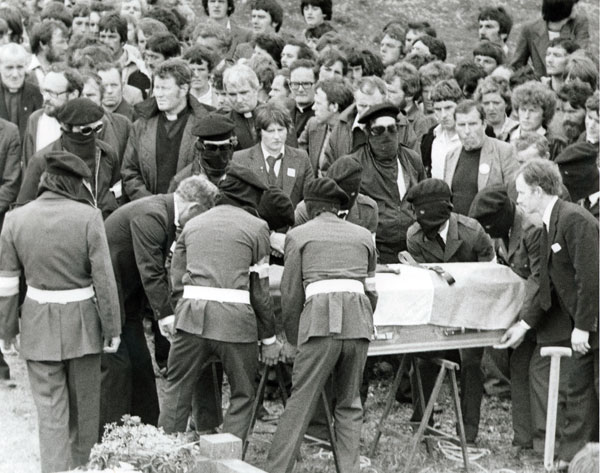
• IRA guard of honour lifts the coffin of Martin Hurson at the graveside
The following morning, Martin Hurson’s body was removed by the RUC to Omagh Hospital without consultation with the family. This was to deny mourners en route the opportunity to pay their last respects. Despite this, over a hundred cars followed the hearse from Omagh to the Hurson home in Cappagh, County Tyrone.
Relatives, friends and comrades carried the coffin for the last mile home, escorted by a uniformed guard of honour and followed by a large procession of sympathisers.
Later, at the Hurson home, guards of honour from the IRA, Cumann na mBan and Fianna Éireann stood to attention as unending lines of mourners filed past the coffin.
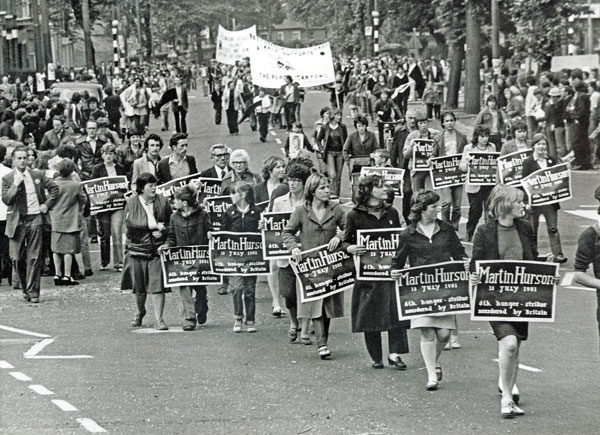
On Wednesday afternoon, Martin Hurson’s relatives carried the Tricolour-draped coffin, with gloves and beret on top, down the country lane from his home to the hearse waiting to take his remains to Galbally Church. A lone piper led the hearse, which was escorted by an IRA guard of honour, followed by Cumann na mBan and Fianna Éireann. Wreath-bearers headed the thousands of mourners as three British Army helicopters flew overhead.
Following the funeral Mass, the guard of honour carried the remains to the burial plot. Four armed and uniformed IRA Volunteers emerged from the mourners and fired volleys from handguns in honour of their dead comrade. They then stood for a minute’s silence.
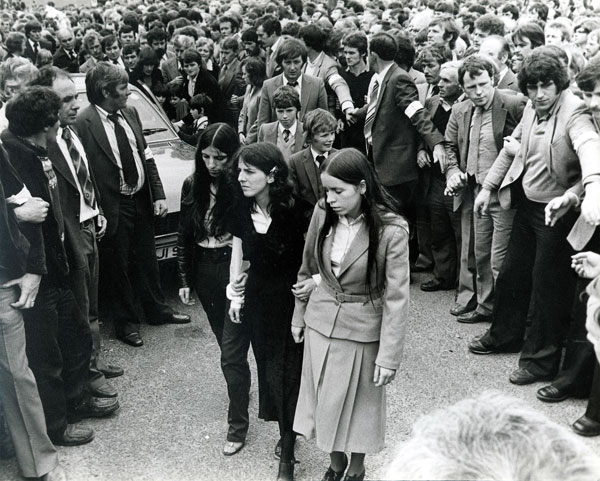
• Martin Hurson’s sisters Josephine, Rosaleen and his fiancé Bernadette Donnelly at the funeral
Tyrone republican Francie Molloy presided over the graveside ceremonies. The 1916 Proclamation was read out and a bugler sounded The Last Post as IRA Volunteers stood to attention in salute of their former comrade.
An impassioned and comprehensive oration was given by Seán Lynch, who had been Hurson’s election agent in the 1981 general election. Speaking of Martin Hurson’s past, Lynch described the 26-year-old as “a member of a large family whose mother died when he was only a boy, a young man who played Gaelic football for the local GAA club in Galbally, a lover of all things Irish who was forced to emigrate and who returned and threw in his lot with those who dispute the claim of England to rule over one inch of Irish soil”.
Seán Lynch talked about the sacrifices of freedom fighters of the time, saying they possessed the same “virtue of patriotism, of spiritual, unselfish love of country as it was understood by Mercier, Casement, Pearse, MacSwiney, Stagg, Sands, and Martin Hurson”.
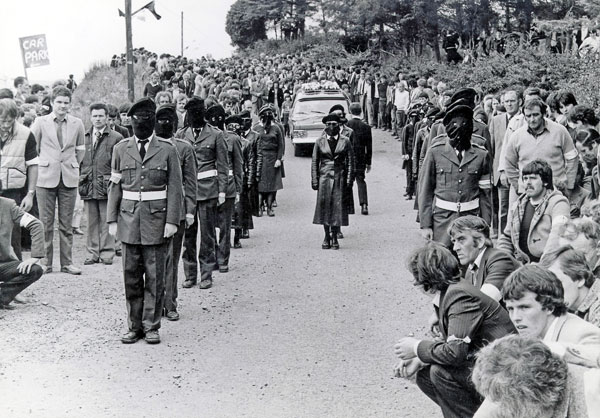
He went on to say their sacrifices would “save the cause of Irish independence from destruction at the hands of foreign enemy and native compromiser, and carry it to victory yet”. There was a certain prophetic note to Lynch’s words and again when he said that the spirit of Martin Hurson shines and “calls like a voice from Heaven, filling young hearts with courage and determination”.
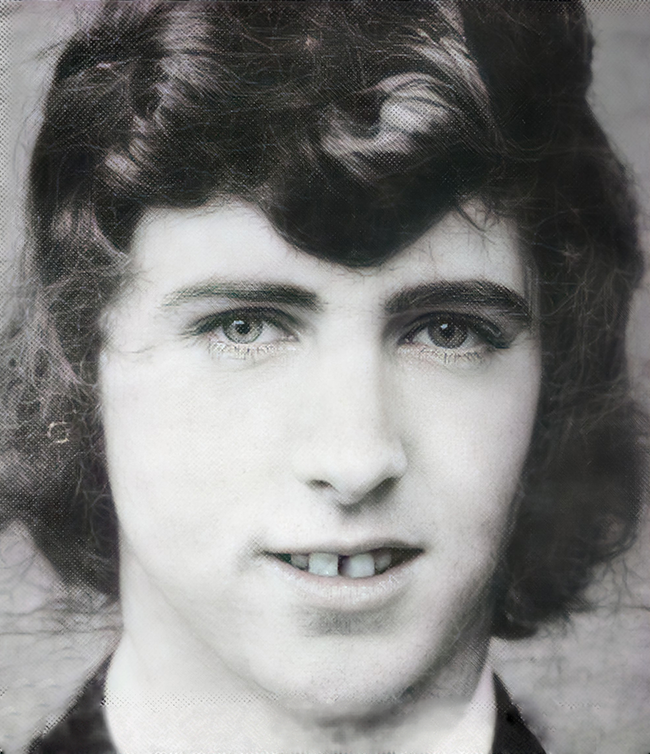
He went on to outline the origins and sources of not only the horrendous conditions endured by prisoners in Armagh and the Blocks but also “all our social and political evils – the British connection”. He also pointed to the “pretence and skulduggery” of the Irish Government of the time who, six deaths later, still refused to support the prisoners’ ‘Five Demands’.
Only three days separated the funerals of Joe McDonnell and Martin Hurson. The proximity of the deaths intensified the depth of frustration and sadness felt by supporters of the Hunger Strikers. Ireland was awash with protests but the British Government still would not budge.
Follow us on Facebook
An Phoblacht on Twitter
Uncomfortable Conversations

An initiative for dialogue
for reconciliation
— — — — — — —
Contributions from key figures in the churches, academia and wider civic society as well as senior republican figures




